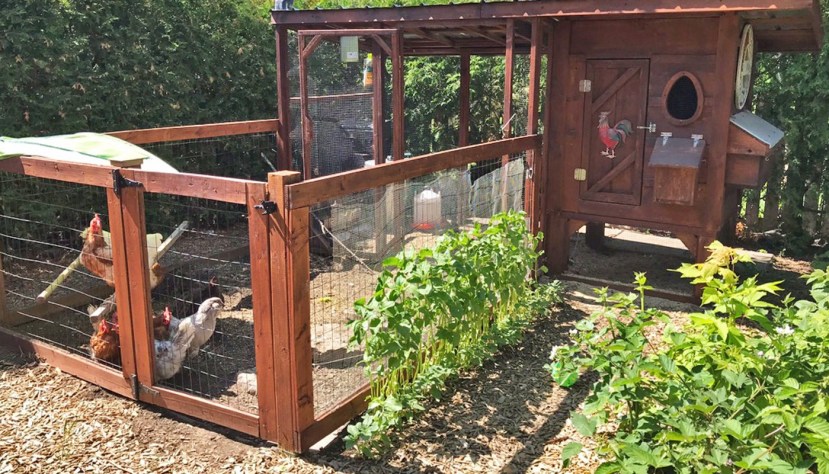New Page
Wednesday, August 19, 2020 - Backyard Chickens: How to Get Started with Urban Farming

Chickens are playful, pretty and if properly cared for, could be the perfect pet that supplies fresh eggs for you and your family. You might be surprised to learn you don’t need to live on a farm to raise chickens—some municipalities allow residents to raise chickens right in their own backyard. But while the prospect of fresh eggs is exciting, there’s a lot to consider before hosting a hen party in your backyard. We’ll walk you through everything you need to know to get started with help from Toronto-based urban farmer Sandra Grilo.
Check your chicken bylaws
Raising chickens can be a fun and fulfilling experience for you and your family, but it’s important to research the local rules and learn about how to keep hens happy and healthy before jumping into urban farming.
“The first thing you’ll want to do is check with your municipal bylaw office to be sure you can legally have hens in your backyard,” says Grilo. Where chickens are allowed, you’ll need to follow the regulations which could include applying for a permit and passing an inspection by a bylaw officer.
Grilo also recommends checking in with your neighbours before building a coop (the promise of a few fresh eggs doesn’t hurt).
“Letting neighbours know of your plans is a nice thing to do and could avoid issues later on,” says Grilo.
Chicken care 101
Like any pet, chickens need to be fed, cleaned up after (“Chickens made a lot of poop!” says Grilo) and cared for if they get sick. Daily must-dos include providing food and clean water, tidying the coop, collecting eggs, letting your hens out in the morning and locking up the coop at night.
“Creating a system and routine that works for you will be key. It takes me 10 minutes in the morning and evening to take care of my hens,” says Grilo who also does a more thorough cleaning of the coop (about an hour’s work) on the weekend, replaces the bedding once a month and does a full cleanout and scrub down of the coop once per season.
In addition to cleaning, ensuring hens have enough food and water is another daily chore.
“People are always shocked to find out that chickens eat everything! Food will be the largest expense, but a manageable one thanks to the fact that chickens are happy to eat every fresh scrap from your kitchen,” explains Grilo. In addition to scraps, Grilo says a 25 kg bag of feed (costs range between $20 to $35 per bag) will feed four or five chickens for about a month.
It’s also a good idea to research what to do if a chicken dies (areas that allow urban chickens will provide information) and to find a local vet who offers poultry care so you’re ready in case of illness.
Setting up the coop
Once you’ve confirmed chickens are welcome in your ‘hood and learned about daily care requirements, the next thing you’ll need to do is build a coop. The coop keeps your hens safe from weather, predators and pests. Cost for a coop ranges from about $200 for a DIY coop to up to $1,000 or more for a store-bought or custom coop with landscaping.
“A typical chicken coop can be made with basic materials like wood, metal mesh, and hardware like hinges and latches. The approximate cost to build a coop yourself would be around $200,” says Grilo. For a pre-built coop, Grilo says there are plenty of options available for purchase online from Canadian retailers or hardware stores like Home Hardware or Home Depot.
To ensure your chickens are safe from predators like hawks, raccoons, rats and dogs, you might need to add safety measures like door locks (Grilo says racoons can open latches) and buried mesh or chicken wire to stop predators from digging their way into the coop.
You’ll also need to get bedding, a water dispenser and a water heater to prevent freezing in the winter (depending where you live). Grilo uses flax straw bedding, which she says is inexpensive and helps control smells. Other options include straw, sand, pinewood and peat moss. Bedding, feed and other accessories can be found at hardware stores or your local farm supply store.
Where to buy chickens
Your coop is ready to go and you’ve gathered all the necessary supplies. Next, it’s time to buy some chickens.
“The best place to source chickens is directly from other farmers. Join Facebook groups for your area specifically for chickens or poultry,” says Grilo. Another option is to search on Kijiji or contact a nearby chicken farm or hatchery and ask for advice.
Grilo recommends starting out with pullets (teenage hens) or hens. Chicks require extra care and you might not be able to tell if the chick is a rooster or a hen right away, which could be a problem in areas that only allow hens.
While raising chickens comes with a few more challenges than a typical pet, Grilo says chickens are smart, social and remarkable animals that make it all worth it.
“What I’ve come to realize is that despite the challenges, having backyard chickens is still one of the most rewarding adventures my family and I have taken on. The past 15 years have taught us so much about these amazing little friends, and I hope more people get to experience the joys of backyard chickens,” says Grilo.
Source CREA cafe July 2020